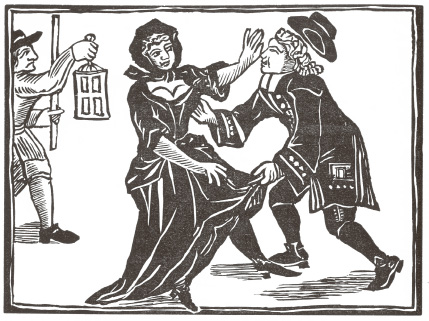
V
My Parents Reared Me Tenderly …
Lust, Infidelity and Bad Living
My Parents Reared Me Tenderly …
Lust, Infidelity and Bad Living
In general in English folk song, marital infidelity is treated humorously: the drunken husband in ‘Our Goodman’ (No. 85) finds cumulative evidence of his wife’s misdemeanours; in ‘Marrowbones’ (No. 82) the wife wants to get rid of her husband; the ‘Cunning Cobbler’ (No. 78) is found under the bed, the ‘Molecatcher’ (No. 83) traps the farmer, and so on. The cuckolded husband, ‘wearing the horns’, is a stock comic character in many forms of popular culture. But there are exceptions, especially in Child ballads like ‘The Gipsy Laddie’ (No. 81) and ‘Little Musgrave’ (Child 81, Roud 52), where the wife’s adultery sets in train the tragic sequence of events related in the story.
Apart from this, the treatment of love and sex in the traditional repertoire varies so widely that it is foolish to attempt to portray folk song as primarily morally ‘pure’ or ‘impure’. The tradition encompasses a broad spectrum from the risqué and mildly bawdy to the downright crude, and each individual will draw their own personal line in a different place, although it must be said that in a largely patriarchal society the songs are bound to reflect a male perspective on the whole. It must also be said that in this area context is all, and what is acceptable from one singer in a particular situation may not be in another. Taste and propriety are slippery concepts, and change over time.
We have come a long way from our Victorian and Edwardian predecessors who shied away from songs which nowadays do not register as bawdy at all, and a number of such cases are highlighted in the song notes. ‘The Ball of Yarn’ (No. 76), ‘Bold Grenadier’ (No. 77), ‘The Nutting Girl’ (No. 84) and ‘Three Maidens to Milking Did Go’ (No. 87), for example, all involve consensual sexual encounters of some sort, and each one made the earlier collectors uncomfortable, as did ‘Young Sailor Cut Down’ (No. 90), which in many versions makes clear that the main character is dying of venereal disease. But before we congratulate ourselves on our modern open-minded maturity, we should remember that we are just as uncomfortable publishing songs which include, for example, racist material, as our Edwardian ancestors were about the sexual.
There is a huge corpus of song which is concerned primarily and explicitly with sex, and it has been argued that one of the only areas in which true ‘folk song’ still exists is in the rugby clubs, barracks and other primarily male milieux. But we decided not to include any material which is explicit by today’s standards, partly because this is a book for the general reader but also because much of that type of song is unacceptably misogynist and mostly puerile.
Many of the ‘Jack on shore’ type of song (see p. 5) feature a young buck who cares nothing for propriety and feels free to break hearts and steal maidenheads with impunity, and ‘Young Ramble Away’ (No. 89) here stands as an example of dozens of songs which feature young men whose attitudes and actions encapsulate what countless mothers have warned their daughters about since time immemorial.
76
The Ball of Yarn
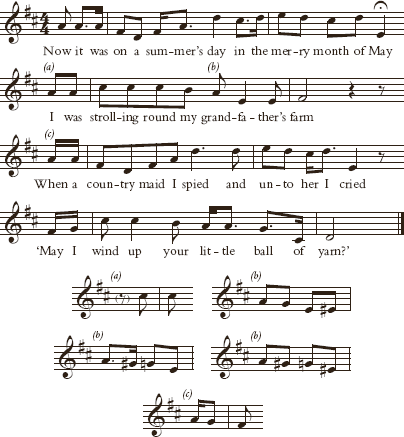
Now it was on a summer’s day in the merry month of May
I was strolling round my grandfather’s farm
When a country maid I spied and unto her I cried
‘May I wind up your little ball of yarn?’
‘Oh no, kind sir,’ said she, ‘you’re a stranger unto me
And you may love another, so be true.’
I said, ‘My little miss you’re the only one I want to kiss
And to wind up your little ball of yarn.’
So I took the country maid and I laid her in the shade
Not intending to do her any harm
And ’twas much to her surprise when I lay between her thighs
And wound up her little ball of yarn.
Now when the maid arose, after pulling up her clothes
She went to tell the people at the farm
So I slipped across the green, not intending to be seen
After winding up her little ball of yarn.
Now it was twelve months to the day, I was strolling down that way
Met a maid with a babe under her arm
I said, ‘My little miss, sure I never thought of this
When I wound up your little ball of yarn.’
So all you country maids take warning from these days
And never go a-strolling round the farm
’Cause the blackbird and the thrush they still whistle in the bush
When he’s winding up your little ball of yarn.
77
Bold Grenadier
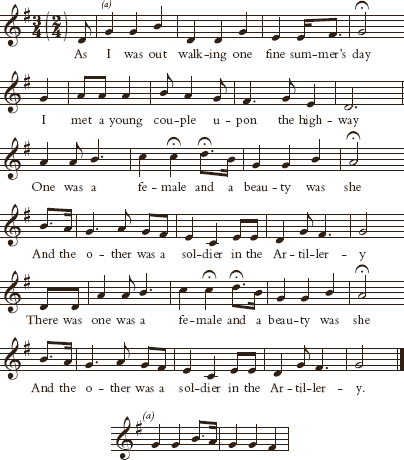
As I was out walking one fine summer’s day
I met a young couple upon the highway
One was a female and a beauty was she
And the other was a soldier in the Artillery
There was one was a female and a beauty was she
And the other was a soldier in the Artillery.
Now the soldier and the female they strolled on together
They strolled side by side till they came to the river
And they sat themselves down by the side of the stream
For she loved to hear the water rattle and the nightingales sing
And they sat themselves down by the side of the stream
For she loved to hear the water rattle and the nightingales sing.
Then the soldier took the female with his arms round her middle
He out with his string and he up with his fiddle
And he played her a tune to the length of his string
For she loved to hear the water rattle and the nightingales sing
And he played her a tune to the length of his string
For she loved to hear the water rattle and the nightingales sing.
Said the soldier to the female, ‘It’s time to give o’er.’
Said the female to the soldier, ‘Just play me one more
Just play one more tune to the length of your string
For I love to hear the water rattle and the nightingales sing
Just play one more tune to the length of your string
For I love to hear the water rattle and the nightingales sing.’
78
The Cunning Cobbler
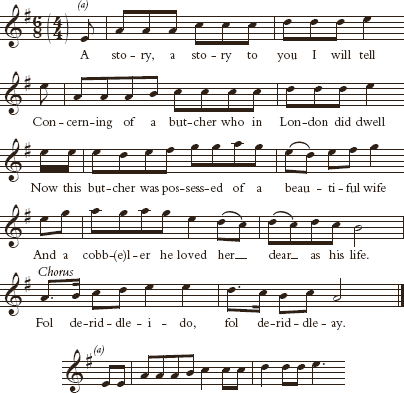
A story, a story to you I will tell
Concerning of a butcher who in London did dwell
Now this butcher was possess-ed of a beautiful wife
And a cobbler he loved her dear as his life.
Chorus
Fol de-riddle-i-do, fol de-riddle-ay.
Now this butcher went to market to purchase an ox
And then the little cobbler as sly as any fox
Put on his Sunday clothing and a-courting he did go
To the jolly butcher’s wife because he loved her so.
And as the little cobbler stepped in the butcher’s shop
The butcher’s wife knew what he meant and bid him to stop
He says, ‘My little darling, have you got a job for me?’
She, smiling, said, ‘I’ll go upstairs and see.’
She went up to the bedroom and gave the snob a call
Saying, ‘I’ve got a tidy job for you if you have brought your awl
And if you do it workmanlike some cash to you I’ll pay.’
‘I thank you,’ said the cobbler and began to stitch away.
He hadn’t been long at work before a knock came at the door
The cobbler crawled beneath the bed and lay upon the floor
‘Lay still,’ said the butcher’s wife, ‘what will my husband say?’
And then she let the policeman in along with her to play.
The butcher came from market and put them in a fright
The policeman scrambled down the stairs and soon was out of sight
The butcher’s wife so nimbly did lock the bedroom door
And in her fright she quite forgot the cobbler on the floor.
And at night when the butcher lay down upon the bed
‘There’s something here is very hard,’ unto his wife he said
His wife said, ‘It’s my rolling pin’, the butcher could but laugh
Saying, ‘How come you to roll your dough with a policeman’s staff?’
And then he threw the truncheon underneath the bed
And broke the you-know-what to bits and cracked the cobbler’s head
The cobbled called out, ‘Murder!’ Said the butcher, ‘Who are you?’
‘I am the little cobbler that mends the ladies’ shoes.’
‘If you are the little cobbler then come along with me
I’ll pay you out for mending shoes before I’ve done with thee.’
So he locked him in the bullock’s pen, the bull began to roar
And the butcher laughed to see the bull toss him o’er and o’er.
And early the next morning when the people were about
The butcher rubbed his face with blood and turned the cobbler out
He pinned a paper to his back and on it was the news
‘The cobbler to the bedroom goes to mend the ladies’ shoes.’
The people were all frightened, as home the cobbler ran
His coat and breeches being torn he looked an awful sight
His wife was amazed to see him so she shouted, ‘O Lor!’
He says, ‘My dear, I’ll never go out stitching any more.’
79
The Devil and the Farmer’s Wife
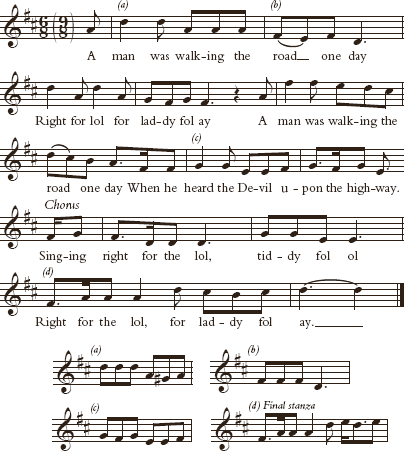
A man was walking the road one day
Right for lol for laddy fol ay
A man was walking the road one day
When he heard the Devil upon the highway.
Chorus
Singing right for the lol, tiddy fol ol
Right for lol, for laddy fol ay.
Said the Devil, ‘My man, I have come for your wife.’
Right for lol for laddy fol ay
Said the Devil, ‘My man, I have come for your wife
For I hear she’s the plague and torment of your life.’
So the Devil he hoisted her up on his back
Right for lol for laddy fol ay
The Devil he hoisted her up on his back
And way off to hell with her straight did he pack.
There were three little devils a-playing at ball
Right for lol for laddy fol ay
There were three little devils a-playing at ball
She ups with her broom and she scatters them all.
There were three little devils all tied up in chains
Right for lol for laddy fol ay
There were three little devils all tied up in chains
She ups with a stick and she knocks out their brains.
So the Devil he hoisted her up on his back
Right for lol for laddy fol ay
So the Devil he hoisted her up on his back
And off to her old man so straight did he pack.
Said the Devil, ‘My man, here’s your wife back again.’
Right for lol for laddy fol ay
Said the Devil, ‘My man, here’s your wife back again
She wouldn’t be kept, not even in hell.’
80
Flash Company
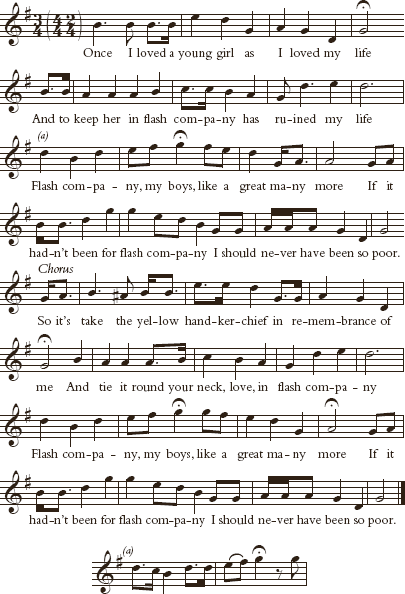
Once I loved a young girl as I loved my life
And to keep her in flash company has ruined my life
Flash company, my boys, like a great many more
If it hadn’t been for flash company I should never have been so poor.
Chorus
So it’s take the yellow handkerchief in remembrance of me
And tie it round your neck, love, in flash company
Flash company, my boys, like a great many more
If it hadn’t been for flash company I should never have been so poor.
Once I had a colour as red as a rose
But now it’s as pale as the lily that grows
Like a flower in the garden with all my colour gone
For you see what I’m coming to through loving that one.
Oh it’s fiddling and dancing was all my delight
And to keep her in flash company has ruined my life
Flash company, my boys, like a great many more
If it hadn’t been for flash company I should never have been so poor.
81
The Gipsy Laddie
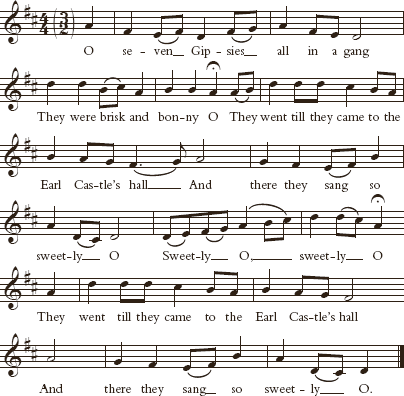
O seven Gipsies all in a gang
They were brisk and bonny O
They went till they came to the Earl Castle’s hall
And there they sang so sweetly O
Sweetly O, sweetly O
They went till they came to the Earl Castle’s hall
And there they sang so sweetly O.
They sang so sweet and so complete
Until downstairs came a lady O
And as soon as they saw her pretty, pretty face
They cast their gazes over her
Over her, etc.
She gave to them a bottle of wine
She gave to them some money O
She gave to them some far finer things
’Twas the gold rings off her fingers O
Fingers O, etc.
She pulled off her high-heeled boots
Put on her Highland plaidie O
‘Last night I slept with my own wedded lord
And tonight with the Gipsies laddie O
Laddie O’, etc.
When her dear lord came home that night
Enquiring for his lady O
The waiting maid made her reply
‘She is gone with the black-hearted Gipsies O
Gipsies O’, etc.
‘So come saddle to me my best black horse
Come saddle it quite swiftly O
So I may search for my own wedded wife
Who is gone with the black-hearted Gipsies O
Gipsies O’, etc.
He rode high and he rode low
He rode brisk and bonny O
He rode till he came to a far water-side
And there he found his lady O
Lady O, etc.
‘What made you leave your house and land
What made you leave your money O
What made you leave your own wedded lord
To follow the black-hearted Gipsies O?
Gipsies O’, etc.
‘I know I’ve left my house and land
I know I’ve left my money O
But here I am and here I remain
So fare you well, my honey O
Honey O’, etc.
Seven Gipsies all in a gang
They were brisk and bonny O
Tonight they are all condemned to die
For stealing Earl Castle’s lady O
Lady O, etc.
82
Marrowbones
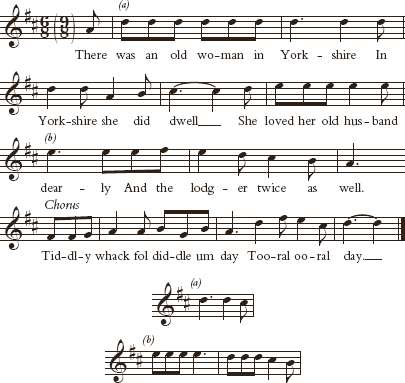
There was an old woman in Yorkshire
In Yorkshire she did dwell
She loved her old husband dearly
And the lodger twice as well.
Chorus
Tiddly whack fol diddle um day
Tooral ooral day.
She sent for the doctor
And asked him oh so kind
Which was the narrowest way
To send her old husband blind.
He told her get some marrowbone
And scrape it fine and small
Rub it in the old man’s eyes
Till he can’t see at all.
The old man said, ‘I’ll go and drown myself
For I can’t see one mite.’
The old woman said, ‘Then I’ll go with you
’Fraid you shouldn’t go right.’
So arm in arm they went on
Till they came to the brim
The old man put his foot to one side
Popped the old woman in.
How the old woman did scream
And how the old woman did bawl
The old man said, ‘I can’t help you
For I can’t see at all.’
She swam around and swam around
Until she came to the brim
The old man got the linen prop
And pushed her further in.
So now my song is ended
And I can’t sing no more
My old woman is drownded
And I am safe on shore.
83
The Molecatcher
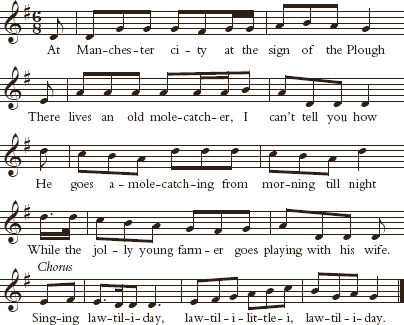
At Manchester city at the sign of the Plough
There lives an old molecatcher, I can’t tell you how
He goes a-molecatching from morning till night
While the jolly young farmer goes playing with his wife.
Chorus
Singing law-til-i-day, law-til-i-little-i, law-til-i-day.
The molecatcher jealous of the very same thing
So he hides in the bakehouse and saw him come in
And when that young farmer got over the stile
It caused the molecatcher to laugh and to smile.
He knocked at the door and thus he did say
‘Pray where is your husband, good woman, I say?’
‘He’s gone a-molecatching, you need not fear.’
But little did she think the molecatcher was near.
She went upstairs, he followed the sign
And the molecatcher followed them closely behind
And when that young farmer was in the midst of his sport
The molecatcher caught him quite fast by his coat.
He clapped his hands and laughed at the sight
Saying, ‘This is the finest mole I’ve catched in my life
I’ll make you pay well for ploughing my ground
And the money it shall be no less than ten pound.’
‘Very well,’ said the farmer, ‘the money I don’t mind
For it only costs me about twopence a time.’
So come, all you young farmer chaps, mind what you’re at
And never get caught in a molecatcher’s trap.
84
The Nutting Girl
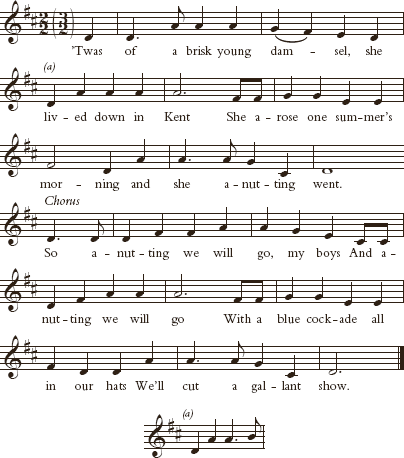
’Twas of a brisk young damsel, she liv-ed down in Kent
She arose one summer’s morning and she a-nutting went.
Chorus
So a-nutting we will go, my boys
And a-nutting we will go
With a blue cockade all in our hats
We’ll cut a gallant show.
’Twas of a brisk young farmer was ploughing of his land
He called to his horses and he bid them for to stand.
He sat himself down on his plough, a song for to begin
His voice was so melodious that it made the valleys ring.
Now John he sung so sweet-i-ly he charmed her as she stood
She had no longer power in that lonely wood to stay
But what few nuts she had, poor girl, she threw them all away.
She went unto her Johnny as he sat on the plough
She says, ‘Young man I feels myself, for I feels I can’t tell how.’
He says, ‘My pretty damsel, come sit you down and hear
I’ll keep you out of danger and I’ll keep you out of fear.’
Now Johnny left his horses, and likewise left his plough
He took her in some shady dell his courage for to show.
He put his arms all round her and gently laid her down
‘O John,’ said she, ‘I think I see the world go round and round.’
Now John returned to his horses all for to finish his song
He says, ‘My pretty fair maid, your mother will think you long.’
But as they tripped along the plain, upon his breast did lean
‘Oh John,’ said she, ‘I long to see the world go round again.’
Come all you pretty damsels, a warning take by me
If you should go a-nutting, I pray be home in time
For if you stay a little too long, to hear the ploughman sing
O you will have a little baby to nurse all in the spring.
85
Our Goodman
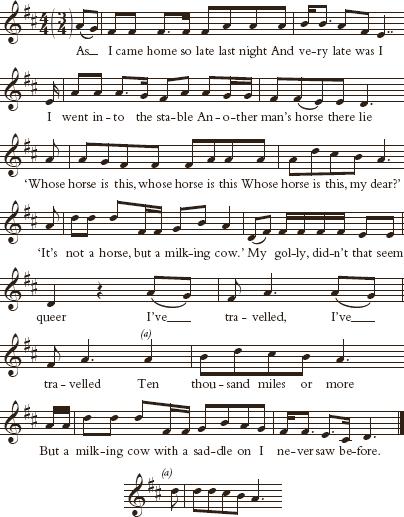
As I came home so late last night
And very late was I
I went into the stable
Another man’s horse there lie
‘Whose horse is this, whose horse is this
Whose horse is this, my dear?’
‘It’s not a horse, but a milking cow.’
My golly, didn’t that seem queer
I’ve travelled, I’ve travelled
Ten thousand miles or more
But a milking cow with a saddle on
I never saw before.
As I came home so late last night
And very late was I
And on the table there
Another man’s hat there lie
‘Whose hat is this, whose hat is this
Whose hat is this, my dear?’
‘It’s not a hat, but a butter tub.’
My golly, didn’t that seem queer
I’ve travelled, I’ve travelled
Ten thousand miles or more
But a butter tub with a brim all round
I never saw before.
As I came home so late last night
And very late was I
And underneath the table
Another man’s boots there lie
‘Whose boots are these, whose boots are these
Whose boots are these, my dear?’
‘They are not boots, but flowerpots.’
My golly, didn’t that seem queer
I’ve travelled, I’ve travelled
Ten thousand miles or more
But flowerpots with elastic sides
I never saw before.
As I came home so late last night
And very late was I
I went upstairs to get in bed
And another man there lie
‘What man is this, what man is this
What man is this, my dear?’
‘It’s not a man, but a newborn babe.’
My golly, didn’t that seem queer
I’ve travelled, I’ve travelled
Ten thousand miles or more
But a newborn babe with whiskers on
I never saw before.
86
Spencer the Rover
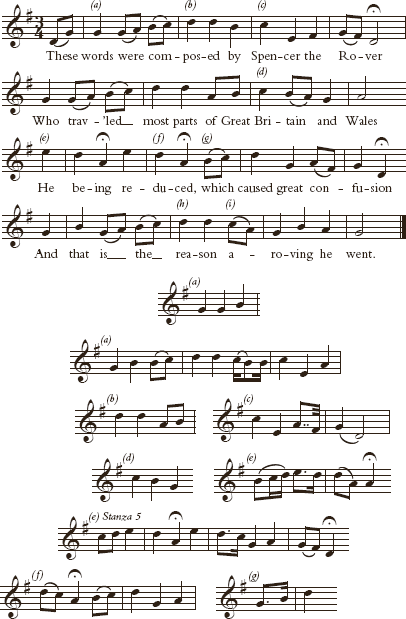
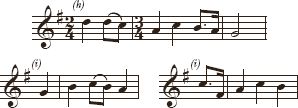
These words were compos-ed by Spencer the Rover
Who travell-ed most parts of Great Britain and Wales
He being reduc-ed, which caused great confusion
And that is the reason a-roving he went.
Through Yorkshire’s broad valleys oh he travel’d for some years
Till being weary of rambling he sat down to rest
At the foot of yon mountain there runs a clear fountain
Of bread and cold water himself did refresh.
It tasted more sweeter than the gold he had wasted
Or the friends which for ever he’d left far away
But the thoughts of his children ever yearning for their father
Brought tears in his eyes and caused him to lament.
His children came round him with their sweet prattling stories
With their sweet prattling stories which drive care away
They were united together, like the birds all of a feather
Like bees in a hive, contented they would be.
So now I am arrived at me homestead so splendid
With roses and woodbines that hang round my door
I’m as happy as those that’s got thousands
Contented I’ll be and go rambling no more.
87
Three Maidens to Milking Did Go
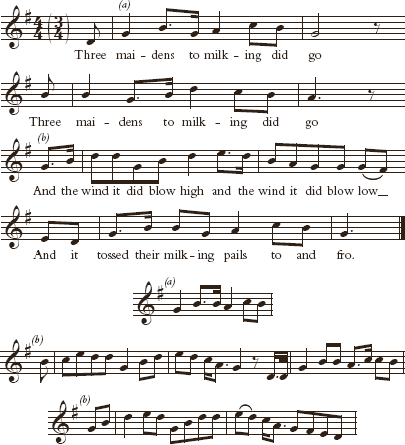
Three maidens to milking did go
Three maidens to milking did go
And the wind it did blow high and the wind it did blow low
And it tossed their milking pails to and fro.
I met with a man I knew well
And I kindly asked of him if he had got any skills
For to catch me a small bird or two.
Oh yes I’ve got some excellent good skills
Now come along with me down by yonder shady tree
I’ll catch thee a small bird or two.
He tapp-ed at the bush and the little birds flew out
Right into her lily-white breast.
Here’s luck to the blackbird and thrush
Here’s luck to the blackbird and thrush
It’s a bird of one feather and we’ll all flock together
Let the people say little or much.
Here’s luck to the jolly dragoon
Here’s luck to the jolly dragoon
We’ll ramble all the day and at night we’ll spend our play
And go home by the light of the moon.
88
The Wild Rover
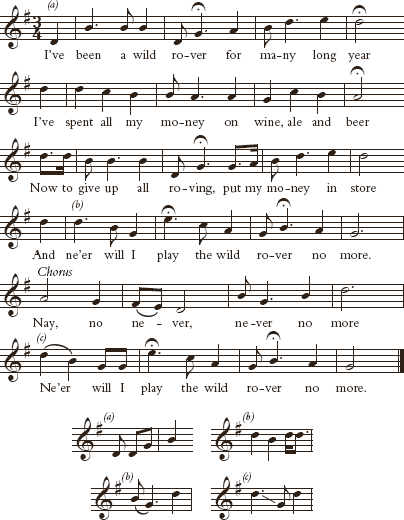
I’ve been a wild rover for many long year
I’ve spent all my money on wine, ale and beer
Now to give up all roving, put my money in store
And ne’er will I play the wild rover no more.
Chorus
Nay, no never, never no more
Ne’er will I play the wild rover no more.
I went into an alehouse where I used to frequent
And told the landlady my money was all spent
I called for a pint but she says to me, ‘Nay
Such customer as you I can meet every day.’
I put my hand in my pocket, drew handfuls of gold
And on the round table it glittered and rolled
‘Now here’s my best brandies, my whiskey and all.’
‘Begone, landlady, I’ll have none at all.’
Now I’ll go home to my parents, tell them what I’ve done
And ask to give pardon to a prodigal son
And if they forgive me, which they’ve done times before
Then ne’er will I play the wild rover no more.
89
Young Ramble Away
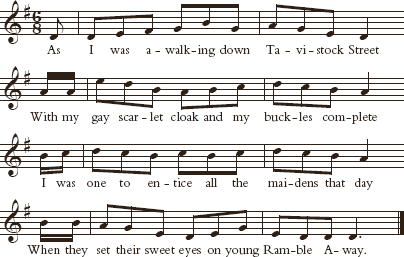
As I was a-walking down Tavistock Street
With my gay scarlet cloak and my buckles complete
I was one to entice all the maidens that day
When they set their sweet eyes on young Ramble Away.
As I was walking through Tavistock Fair
I saw my bright Nancy a-combing her hair
With my cap and my ribbons so bright and so gay
She could not but look at young Ramble Away.
As I was a-walking that night in the dark
I stood at her door and I shone as her spark
I whistled, she looked from her window to say
‘Are you the young lad they call Ramble Away?’
When twenty-four weeks they were over and past
This fair pretty maiden did sicken at last
Her gown would not meet nor her apron strings stay
And ’twas all through the love of young Ramble Away.
‘My dad and my mammy from home they are gone
But when they return I will sing them a song
I’ll sing them a song and I’ll have them to say
“Alas! you’ve been playing with Ramble Away.”’
So come pretty maidens, wherever you be
With courting young fellows don’t make yourselves free
For if you should be so you’ll rue the sad day
When you met with the like of my Ramble Away.
90
Young Sailor Cut Down
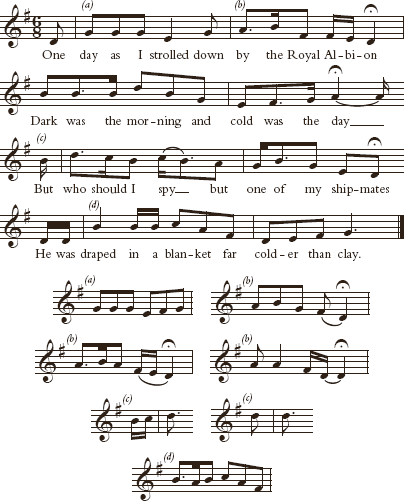
One day as I strolled down by the Royal Albion
Dark was the morning and cold was the day
But who should I spy but one of my shipmates
He was draped in a blanket far colder than clay.
He called for a candle to light him to bed
Likewise a pillow to wrap round his head
For his poor head was aching, his poor heart was breaking
For he was a sailor cut down in his prime.
We’ll beat the drums o’er him, we’ll play the pipes merrily
We’ll play the dead march as we carry him along
Take him to the churchyard and fire three volleys o’er him
For he was a sailor cut down in his prime.
His poor aged father, his dear old mother
Oftimes have told him about his fast life
Along with those flash girls his money he squandered
Along with those flash girls he took his delight.
But now he is dead and laid in his coffin
Six jolly sailor boys walk by his side
And each of them carrying a bunch of white roses
That no one might smell him as we pass them by.
At the top of the street you will see two girls standing
One to the other doth whisper and say
‘Here comes the young sailor whose money we’ve squandered
Here comes the young sailor cut down in his prime.’
On top of the tombstone you will see these words written
‘All you young fellows take a warning by me
And never go courting the girls of the city
For the girls of the city was the ruining of me.’
So we’ll beat the drums o’er him, we’ll play the pipes merrily
We’ll play the dead march as we carry him along
Take him to the churchyard and fire three volleys o’er him
For he was a sailor cut down in his prime.